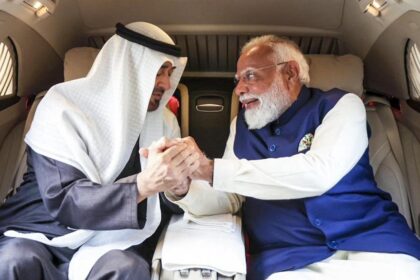Protests Sweep Punjab University as Students Demand Fee Rollback
Chandigarh: The Punjab University campus remained tense on Monday as students continued their indefinite protest against the proposed fee hike and long-pending administrative issues. Demonstrations, sit-ins, and marches have paralyzed academic activity, forcing the university to suspend classes indefinitely.
- Protests Sweep Punjab University as Students Demand Fee Rollback
- Classes Suspended, Examinations Postponed
- Hostel Shortages and Basic Facility Crisis
- Police Presence and Security Measures
- Government Reaction and Political Undertones
- Voices from the Campus
- Academic Experts React
- Media and Public Response
- Global India Broadcast News Analysis
- Possible Resolution Ahead
The Punjab University protests 2025, led by the Students for Reform Union (SRU) and backed by several independent student groups, erupted late last week after the university announced a 25% increase in semester fees and additional hostel maintenance charges for the 2025–26 academic session.
Students say the decision comes amid rising living costs, poor hostel conditions, and delayed stipend disbursements. “We are not against development, but the administration must understand our reality. Education cannot become a privilege for the rich,” said Ravi Kumar, a postgraduate student of Political Science.Administrative Response and Talks Stall
University officials have acknowledged the students’ concerns but insist the fee revision was “necessary” to maintain infrastructure and services. A statement released by the Registrar’s office claimed that Punjab University is facing a “financial deficit exceeding ₹80 crore,” necessitating a rational fee adjustment.
However, negotiations between the Vice-Chancellor’s office and student representatives failed to yield consensus on Sunday. Talks were adjourned after the student delegation demanded a complete rollback of the fee hike before further discussions.
A senior official, requesting anonymity, said:
“We are open to dialogue, but the protests have disrupted operations. The University needs to balance affordability with sustainability.”
Meanwhile, the university’s official website temporarily went offline due to high traffic from concerned parents and students seeking updates.
Classes Suspended, Examinations Postponed
In an official notice released on Monday morning, Punjab University announced a temporary suspension of academic activities, citing safety concerns for staff and students. End-semester examinations, scheduled for next week, have been postponed until further notice.
The notice, uploaded on the university’s administrative portal, also urged students to “maintain calm and avoid confrontation with security personnel.”
“We understand the frustration among students. The administration is working towards a balanced solution,”
said Dr. Poonam Bhalla, Dean of Student Welfare.
Hostel Shortages and Basic Facility Crisis
While the fee hike remains the central issue, several student leaders pointed out that the protests stem from deeper administrative negligence. Reports suggest that over 40% of hostellers face water shortages, overcrowded rooms, and delayed maintenance.
“Paying more for less is unacceptable,” said Simranjeet Kaur, a research scholar in Sociology. “We have students sleeping in common halls due to hostel unavailability. The administration talks about modernization, but basic amenities are missing.”
The Punjab University Teachers’ Association (PUTA) has also expressed solidarity with students, urging the government to step in with financial aid.
Police Presence and Security Measures
The Chandigarh Police have increased deployment around the university gates, with barricades set up near Sector 14 and 25. On Sunday night, minor scuffles were reported between protesters and police when a group attempted to block the Vice-Chancellor’s convoy.
No serious injuries were reported, and authorities have refrained from imposing Section 144, preferring to maintain peace through dialogue.
Chandigarh Senior Superintendent of Police (SSP) assured that the situation is under control:
“Our role is to ensure student safety. The right to protest is respected, but violence will not be tolerated.”
Government Reaction and Political Undertones
The Punjab government has taken note of the ongoing protests. Education Minister Harjot Singh Bains has called for an immediate report from the University Grants Commission (UGC) on the matter.
Opposition parties have used the moment to criticize the ruling coalition, accusing it of neglecting public education. The Youth Congress staged a solidarity march outside the university gates, while Aam Aadmi Party (AAP) leaders urged students to remain peaceful.
Political analysts see the event as part of a broader national debate on education accessibility amid rising tuition costs across public universities.
Voices from the Campus
Students across departments have come together, forming temporary committees to coordinate communication and media outreach.
“We have no intention to disrupt education — our movement is for the right to affordable learning,” said Meenakshi Sharma, a student leader from the Department of Economics.
Postgraduate student Aditya Verma added,
“When administrators travel in luxury cars while students can’t afford hostel food, something is deeply wrong.”
Meanwhile, social media has amplified the movement. The hashtag #SavePunjabUniversity trended across X (formerly Twitter) and Instagram on Sunday, with over 200,000 mentions within 24 hours.
Academic Experts React
Education experts argue that the Punjab University protests highlight a national pattern of underfunding and bureaucratic inefficiency.
Dr. Anuradha Menon, education policy researcher at the Indian Institute of Education Studies, noted:
“Fee hikes are a symptom, not the cause. The real crisis lies in structural funding gaps and the shrinking public education budget.”
A 2025 UGC report also revealed that state universities have witnessed an average 18% decline in grants since 2020, forcing administrations to rely heavily on student fees.
Media and Public Response
National media outlets, including The Hindu, NDTV, and Hindustan Times, have covered the protests extensively.
An article from Hindustan Times highlighted the students’ frustration and called for transparent communication between authorities and the student community.
Hindustan Times
Global India Broadcast News Analysis
According to the editorial desk at Global India Broadcast News, the Punjab University protest serves as a reminder that public education systems require robust financial planning, not reactive fee hikes.
The protest movement has sparked similar sentiments among students in Delhi, Patiala, and Amritsar — signaling a possible wave of coordinated campus movements if demands remain unmet.
Global India Broadcast News has been monitoring this situation closely and will continue providing verified updates as events unfold.
Possible Resolution Ahead
As of Monday evening, the Vice-Chancellor is expected to hold a fresh round of talks with student leaders, possibly mediated by the Chandigarh Education Department. Sources suggest that a partial rollback of the fee increase may be considered, alongside a government grant proposal to stabilize university finances.
If accepted, academic activities could resume within the week — but uncertainty prevails among students who demand written guarantees and transparent budgeting.
The Punjab University protest of 2025 stands as one of the most significant student movements in recent years, reflecting deep-rooted concerns about affordability, governance, and inclusivity in higher education.
As India continues to push for digital transformation and academic excellence, the voices from Chandigarh echo a fundamental reminder: education must remain a right, not a privilege.












